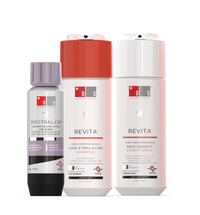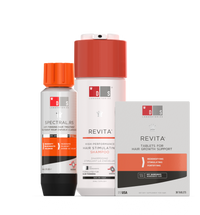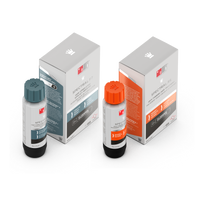Dihydrotestosterone, or DHT, is often associated with males because it is a male growth hormone. However, females have it as well. When it’s properly balanced, it doesn’t cause any issues. But when too much DHT is found in the body, it can cause both male- and female-pattern baldness. Here’s what you should know about DHT, why some females have it in higher amounts, and what you can do about it.
What Causes High DHT Levels in Women?
Translation missing: en.blogs.article.author_on_date_html
What Is DHT?
DHT is a hormone that’s converted from testosterone by the enzyme 5a-reducatase. Since males typically have higher levels of testosterone, they also tend to have higher levels of DHT. Most women only have small amounts of testosterone, which means they tend to have minute levels of DHT. However, even if testosterone is only slightly elevated in some women, it can lead to DHT-triggered hair loss.
Why Do Some Females Have Elevated Levels of DHT?
There are a variety of reasons for elevated testosterone and DHT in some women. Here are some of the most common hormonal disorders responsible for DHT-related hair loss:
-
Polycystic ovary syndrome, or PCOS: This is a condition that occurs in women who have excess androgen hormones. It is characterized by prolonged or irregular periods, enlarged ovaries and unwanted body hair growth. It’s also associated with infertility, type 2 diabetes, obesity and elevated testosterone.
-
Hirsutism: This hormonal condition is caused primarily by androgen hormone imbalance. It can cause body hair to grow on the chest, back and face. However, it can also cause an increase in testosterone, which can trigger loss of scalp hair.
- Congenital adrenal hyperplasia: In many cases of CAH, the body produces too much androgen, which directly affects the adrenal glands and interferes with overall hormonal balance. Common symptoms of this disorder include early appearance of pubic hair, infertility, severe acne and masculine characteristics. DHT-related hair loss is also a possible symptom.
If you think you have any of these conditions, talk to your doctor. He or she may be able to recommend hormone treatments that can help restore hormonal balance and minimize DHT-related baldness.
What’s the Connection Between DHT and Hair Loss?
The strangest thing about DHT is that it is necessary for hair growth all over the body, but it is detrimental to hair growth on the head. DHT can cause hair loss by binding to hair follicle receptors and weakening them. This process is called miniaturization of the follicles. Over time, the receptors can die off, which leads to complete end of hair growth for the affected follicles. This can lead to female-pattern baldness, which tends to affect the part line first, then gradually radiates form the top of the hairline downward. Eventually, total baldness can occur.
What Are Signs of High DHT in Females?
There are several symptoms that can point to excess DHT in females. These include:
- Increased muscle mass
- Balding
- Enlarged clitoris
- Excess facial hair
- Acne
- Decreased breast size
- Irregular menstrual cycles
- Changes in mood
- Deep voice
- Low libido
- Hair loss on the head
- Obesity
- Infertility
If you have too much DHT, you may only experience one or two of these symptoms. Or, you may experience most of the symptoms on the list. No matter how few or how many symptoms you may have, it’s worth getting a hormone test to confirm your diagnosis. Once you know the root cause of the problem, you can seek treatment.
Is DHT-Related Hair Loss Reversible?
The great news about DHT-related hair loss is that it is, in fact, reversible in most cases. They key is to block the enzyme 5a-reductase from converting testosterone into DHT. Fortunately, there are a variety of supplements and products that can do this. Once you effectively block the enzyme, you can stop further hair loss. But stopping hair loss isn’t enough. You probably want to regrow the hair you lost, right? There are hair-stimulating products that can help you achieve this goal.
How Can You Regrow Your Hair After Hair Loss?
We offer a variety of products clinically proven to address common causes of hair loss in women and restore healthy hair growth on the scalp. They include:
-
Spectral.CSF: CSF is a topical hair revitalizing system that helps women achieve thicker, fuller hair. The water-based treatment doesn’t leave the hair feeling greasy or heavy. It contains a variety of compounds known to improve hair volume and length, including Nanoxidil®, adenosine, TriCopper peptides and zinc gluconate. These ingredients and many more help to prevent further hair loss and increase hair density and growth.
-
Revita Shampoo: Revita Shampoo is our signature hair loss product. It delivers phenomenal results for both men and women who have DHT-related hair loss. It protects the scalp against follicular dysfunction and begins to revive damaged hair follicles within days of use. It contains ingredients touted for their hair-growth benefits, including taurine, procyandin B2, rooibos tea and emu oil.
- Revita Tablets: Like our topical products, our Revita Tablets show remarkable promise for people with hair loss, but they work from the inside out. They provide the nutritional foundation necessary for the growth of strong, thick hair. They contain iron to reduce fallout and genistein for hair health, as well as many other ingredients essential for hair growth.
Ready To Find the Right Hair Stimulating Products?
At DS Laboratories, we know that no two scalps are exactly the same. That’s why we have formulated a variety of products that can target different types of hair loss. We invite you to take out our quick and helpful hair assessment quiz to determine which of our products is the best fit for your hair growth goals.

















